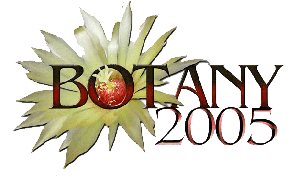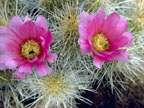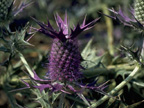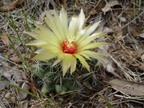W-1
Writing Floristic Treatments: A Workshop for Authors, Based
on the Flora North America
Experience
Time:
8:00 am - 5:00 pm
Presenter: Dr. Nancy R. Morin, The Arboretum at Flagstaff, AZ
This
workshop will sharpen authors' skills in preparing and writing
treatments for major floristic projects such as the Flora
of North America project. Included will be considerations
for consulting herbarium specimens, on how to organize information
for large taxa, on nomenclature and bibliography, and on
how
to provide information for illustrators. Furthermore, the
entire editorial process (used by FNA) as it affects authors will
be
covered, from initial submission through composition. The
workshop is open to all authors of floristic treatments, actual
or prospective,
even though the emphasis will be on FNA approaches. Participants
are encouraged to review the latest FNA Guide for Contributors,
as it appears on the FNA web site.
W-2
Activities & Ambassadors:
Using Living Collections to Teach Schoolchildren
through Field Trips
Time:
8:00 am - 12:00 pm
Presenter:
Matthew Cole, Director of Education, Green Bay Botanical Garden,
WI
The
living collections in college and university gardens, greenhouses
and arboreta can be a great resource for schools.
Through field trips and public visits, you can promote the importance
of your
work, the mission of your institution, Botany, Science
and the beauty of the plants themselves. School groups can be your
outreach
to the community, give your students experience in
teaching or even serve as a revenue stream, but today's school
teachers have
specific needs. Teaching to standards or benchmarks
alone may not convey the value of your collection or the excitement
students
can find in plants. Learn how to make your collections
(and botany) accessible to visitors through an ambassadors and
Activities
field trip model. After exploring examples, participants
will have a chance to work on tours that would fit their own institution.
If they choose, participants can develop an outline
for Ambassadors
and Activities visit appropriate for their collection.
W-2
a Educating the Educator Workshop
Time: 8:00
am - 12:00 pm
Presenters: Stephen Brueggerhoff, Peggy Murphy, F.M. Oxley,
and Marco Pinchot, IV
Come play
with the Wildflower Center! During this fun, interactive workshop,
educators will have the opportunity to learn about the
Wildflower Center’s native plant curriculum, Exploring the
Native Plant World. Wildflower Center educators will lead participants
through the curriculum, illustrating selected concepts from each
grade level and engaging participants in hands-on activities that
demonstrate each concept.
W-3 Keep Your Biology Class
Alive with Fast Plants Time:
8:00 am - 12:00 pm
Presenter: Paul H. Williams, Atwood Professor Emeritus,
Univ. of Wisconsin-Madison & WFP Program Director,
Wisconsin Fast Plants Program • University
of Wisconsin – Madison, WI
Students grasp the concepts working with a life cycle of Fast
plants; portable take-home experiments; techniques for producing
your own seed; variation, inheritance and evolution; meet the
home team of Fast Plants, known for their intensive, hands-on
workshops. www.fastplants.org
Time:
8:00 am - 10:00 pm
Presenter: Beth E. Hazen, Ph.D., Production Editor, American
Journal of Botany
Learn how to tighten and polish your writing, conquer the comma,
identify “red flags,” and more. Pertinent
grammar, punctuation, terminology and word usage,
style, tables and
figures. Emphasizes frequent problems and examples
from manuscripts submitted for publication.
Receive reference handbook written for plant scientists, expands
on workshop topics, includes problems and writing resources,
premailed to participants for review and problem solving.
W-5 Teaching Through Inquiry
Time:
8:00 am - 10:00 am
Presenter: Gordon Uno, University of Oklahoma
Inquiry, which has been recognized as the method to drive science
education reform, helps students discover and
construct an understanding of scientific concepts on their
own under the
guidance of the instructor. This workshop will
introduce participants to different kinds of inquiry and
the general techniques of
inquiry instruction using a variety of short,
hands-on activities and information about the Introductory
Botany course at the
University of Oklahoma, which is taught using
this method. In addition, participants will learn how to
develop “discovery” activities
on their own and how to make traditional laboratories
more inquiry-oriented. We will also address the most common
problems
in teaching biology today, with suggestions
and examples of how to deal with or overcome these problems.
This workshop
will introduce participants to a new biology
education initiative from the American Institute of Biological
Sciences (AIBS);
ideas for the initiative will be solicited. Workshop
will include an introduction to the BSA Sci-Π program.
W-6
BSA Sci-Π: Seeds of Change in
the Classroom
Time:
10:15 am - 12:15 pm
Presenter(s): Bill Dahl, Beverly Brown, Claire Hemmingway, The Botanical Society
of America
The
Sci-Pi project, recently initiated by the Botanical Society
of America, provides an innovative and well-resourced way to
address
common standards of learning for science using plants. The
project involves the hands-on approach of sprouting seeds to
teach inquiry
and the scientific process. In this project, students conduct
experiments on seed germination and seedling growth, and receive
feedback from peers and plant scientists. Classes across the
country will be linked via a web site that facilitates discussions
among students at multiple levels, including middle school,
high school, and undergraduates. When students have more advanced
questions, experts in the field are available. The web site
includes
a “Teachers Only” section where teachers can share
successful approaches and access detailed supporting material
for both the botanical content and using a guided inquiry or
inquiry-based approach. The project is low cost and does not
require specialized equipment. The activity addresses several
of the National Research Council's National Science Education
Standards including life cycles of organisms, structure and
function in living systems, reproduction and heredity, diversity
and adaptations
of organisms, and interdependence of organisms. There are also
many ways to create interdisciplinary links, particularly with
mathematics and chemistry. It is our hope that by attending
this workshop you will see the benefits of participating in
our on-line
scientific exchange and bring the excitement of experimenting
with sprouts to your classrooms.
W-7
Writing for ESL Authors
Time:
11:00 am - 12:00 pm
Presenter: Beth E. Hazen, Ph.D., Production Editor, American Journal of
Botany
Articles
and prepositions for authors whose native language is not
English.
W-8
Implementing a Cooperative Group Learning Environment in Hands-On
Biology Labs for Non-majors: Lessons from the Trenches
Time:
1:00 pm - 5:00 pm
Presenter: Dr. Staria Vanderpool, Department of Biological Sciences,
Arkansas State University
A hands-on
workshop for people who may be considering modification of
lab experiences for non-majors biology lab from a traditional
confirmatory/demonstration model to an investigative model. Our
non-majors biology program is typical of mid-size and large institutions,
with high enrollment of students in a required course that is
staffed by graduate teaching assistants under the supervision
of an instructor. Our typical annual student enrollment in the
lab is 1500 students so there are significant logistical problems
involved in developing, staffing, and managing an open-ended,
investigational laboratory environment. Solutions to some of
these problems include using a cooperative learning method, multi-week
labs, and concentration on the process of scientific investigation.
Student response has been positive as we resolved implementation
problems. Assessment of the effectiveness of the change indicates
significant increase in the student’s overall interest
in science, understanding of the use of science reasoning, and
the role of science in non-science careers, thus validating the
role of laboratory sciences as part of the general education
component of the undergraduate degree program.
Time:
1:00 pm - 5:00 pm
Presenters: Brent D. Mishler, Director, University and Jepson
Herbaria
Kirsten M. Fisher, Dept of Integrative Biology, University of
California, Berkeley
Reconstructing
the tree of life is evolutionary biology’s
greatest challenge. This workshop will provide an introduction
to the concepts behind “tree thinking” and phylogenetic
principles, and will review our most current understanding of
the overall tree of life. We will introduce the basic methods
of phylogenetic analysis and conduct a hands-on demonstration
of classroom exercises appropriate for grades 9-12 and introductory
university level biology classes. The green plants are emphasized,
because of their utility in teaching these concepts, but the
workshop will also introduce the general principles behind the
algorithms that are used to build phylogenetic trees in computer
analyses, and will provide an interactive demonstration of computer-based
tree reconstruction. These basic exercises will provide the basis
for understanding the principles behind reconstructing the tree
of life, and we will discuss the practical importance of understanding
the evolutionary relationships of organisms.
Target Audience: High school and introductory undergraduate biology
teachers.
W-10
C-Ferns in the Classroom Time:
1:00 pm - 5:00 pm
Presenter: Whitney Crispen Hagins, Lexington High School, Lexington,
MA
C-FERN of Ceratopteris is a genus of ferns that are found in
many tropical and subtropical regions. They are an ideal model
plant system for teaching many aspects of botany and genetics.
The concept of alternation of generations actually comes alive
with C-ferns since the students can see each of the generations
and follow their development. Students can see the chemotactic
response of sperm swimming towards the archegonia. Genetic
exercises with C-FERN actively involve students in acquiring
data, testing hypotheses and manipulating the organism. For
example, students can follow a trait that is expressed phenotypically
in 2 distinct generations (gametopyhte and sporophyte). After
collecting data on F1 segregation in the gametophyte generation,
students initiate and visualize fertilization by adding water
to the cultures. C-FERNS are easily grown in the classroom
with minimal equipment. Their relatively short life span makes
them ideal organisms for student investigations. Participants
will learn how to grow C-FERNS and will receive copies of investigations.
W-11
Technical Writing II
Time:
1:00 pm - 3:00 pm
Presenter: Beth E. Hazen, Ph.D., Production Editor, American
Journal of Botany
Learn how to tighten and polish your writing, conquer the comma,
identify “red flags,” and more. Pertinent
grammar, punctuation, terminology and word usage,
style, tables and
figures. Emphasizes frequent problems and examples
from manuscripts submitted for publication.
Receive
reference handbook written for plant scientists, expands on
workshop topics, includes problems and writing resources.




